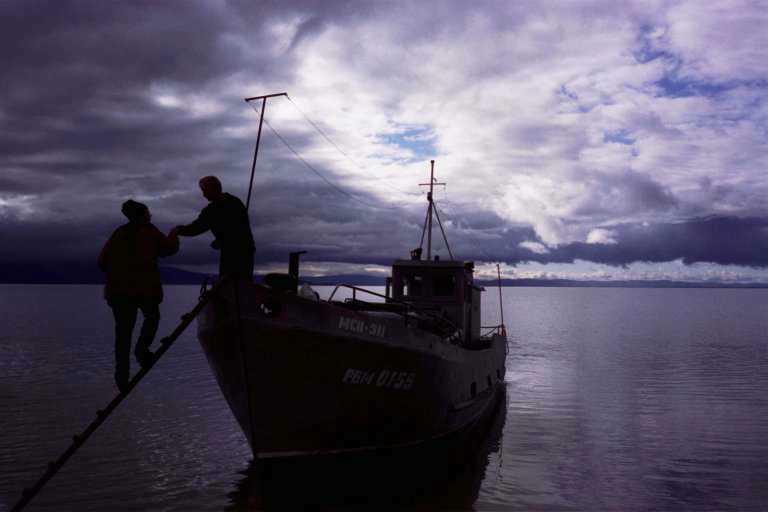The protectors of the world’s largest fresh water lake may be put out of business by a Russian court
A boat captain welcomes a passenger aboard in Zabaikalsky National Park, on the eastern shore of Siberia’s Lake Baikal.
Siberia's Lake Baikal is the largest fresh water lake on the planet.
Despite being far from most of civilization, Baikal faces a long list of environmental challenges.
But unlike many of the world's natural wonders, it doesn't have many organizations trying to protect it. Now, just about the only local voice for protecting Baikal is facing possible shutdown at the hands of the Russian government.
The World's environment editor Peter Thomson is the in-house expert on Lake Baikal and wrote the book "Sacred Sea: A Journey to Lake Baikal."
"Even if you don't pay much attention to what's going on in Russia these days you've probably heard that the government there has been putting a lot of pressure on independent citizens' groups," he said. "What folks in the west often call NGOs, or non-governmental organizations."
Last year, Russia adopted a law that requires any NGO that gets funding from outside the country and also engages in political activity to register as a "foreign agent." In a place like Russia, with has a long history of distrust of outsiders, can be tantamount to being branded a spy.
It's taking a while for this law to ripple through Russian society, but a few weeks ago a court in Irkutsk ordered a local group called Baikal Environmental Wave to register as a foreign agent because, the court ruled, the group meets those two criteria — they get money from outside the country and they engage in political activity.
The group says it won't do that.
Thomson spoke with one of the group's two leaders, Jennie Sutton. She's a Brit who's lived near Lake Baikal for almost 40 years and is a Russian citizen. She told him Baikal Environmental Wave won't register for a couple of very plain reasons.
"'First and foremost,' she told me, 'registering would be a lie. Secondly, it would destroy one's image with the general public,'" Thomson said.
Being called a foreign agent in Russia can put one in an untenable, if not outright dangerous, position.
"And of course Baikal Wave isn't working as a front for anyone," Thomson said. "They're local folks working to protect this lake, which is really among the most amazing places on earth."
It's the oldest and deepest lake on earth — more than a mile deep. It's also the largest lake in the world by volume — with roughly the same amount of water as all of North America's Great Lakes combined.
It also has some of the purest water you'll find anywhere on the planet.
"Because it's so old and so big, it's home to more than a thousand animals and plants that exist nowhere else, including the world's only species of fresh water seals," Thomson said.
All that earned it a spot on the UN's list of World Heritage Sites.
"It's also just incredibly beautiful," he added.
There are two big issues facing Lake Baikal that Baikal Wave has been able to help defeat. One was a huge oil pipeline that would've gone through the watershed and very close to the lake itself. After a lot of pressure from Baikal Wave and others, a few years back, it was rerouted.
The second issue is a paper mill right on the shore of the lake that has been dumping PCBs and other pollutants into Baikal for decades. The wave was involved in a long and torturous fight to close that factory … and after a lot of back and forth it does seem to have shut down just this year.
Of course there are still more threats. Among them are mining in the lake's watershed, Illegal logging, pollution from tourism and second home development around the lake is a big one.
"While there are strong laws on the books about protecting Baikal, they're largely ignored," Thomson said.
But Baikal Environmental Wave is up against the wall. The short story is, without outside funding, the group has no hope.
"There is no tradition in Russia of public support for NGOs. Even Greenpeace, that has a whole group of people working on raising money, can only raise something like ten or 12 percent of its budget," Sutton said.
Sutton said her group is going to appeal the court ruling, but that they expect they'll probably lose.
"Ultimately, they'll probably be faced with big fines that they just won't be able to pay, and so they'll have to close," Thomson said.
If that happens, then at least for now, Baikal will be left without any significant domestic citizens group fighting for its protection.
